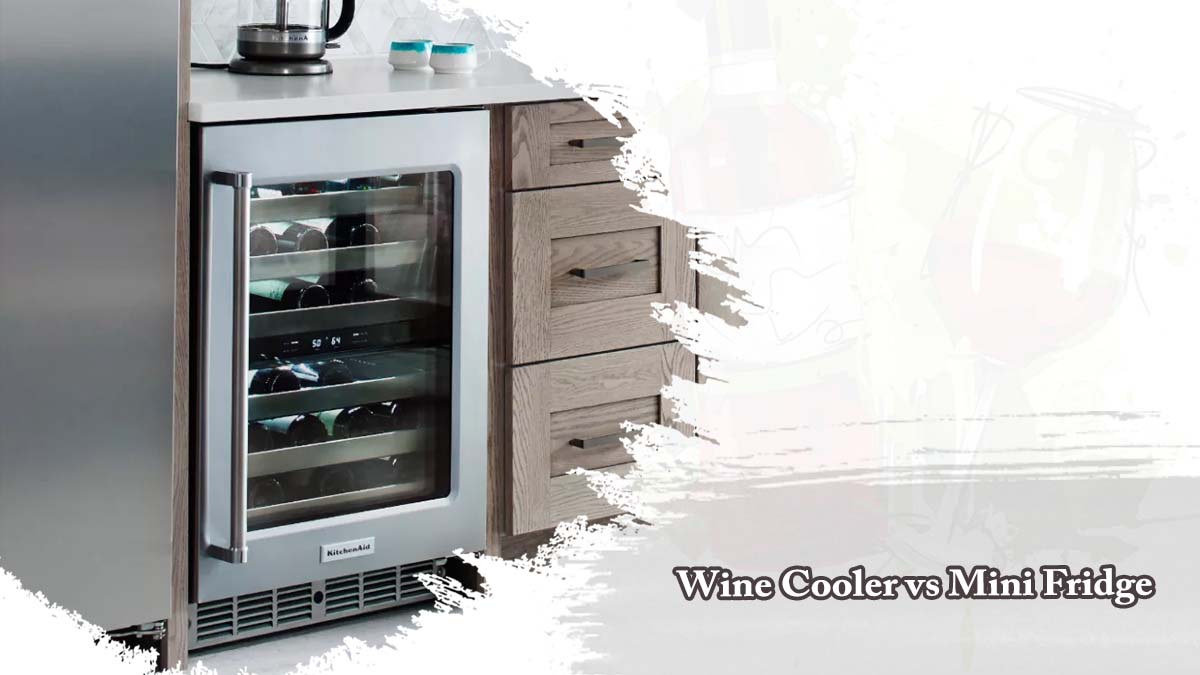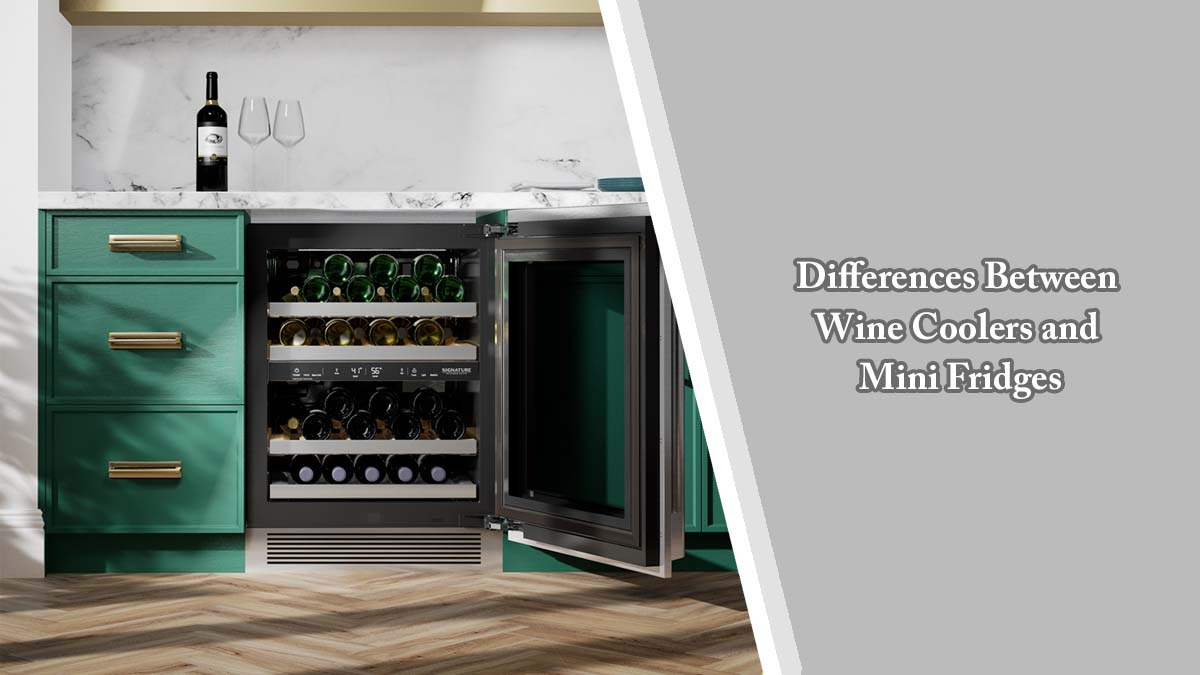Wine Cooler vs Mini Fridge
Are you in the market for a new way to store your favorite beverages? Well, the age-old decision between purchasing a mini fridge and picking up one of those sleek-looking wine coolers has been pondered long and hard by many individuals. While both can provide efficient storage solutions depending on your needs, it’s important to understand each appliance’s unique functions so that you can make an informed buying decision.
In this blog post, we’ll dive into both products and explain their differences in detail – giving you all of the information necessary to pick out the right appliance for your specific preferences. So if you’re looking for guidance on which style cooler is ideal for your beverage storage requirements, keep reading!
Overview of Wine Cooler vs Mini Fridge
Wine coolers and mini-fridges are both popular appliances used to store food and beverages at optimal temperatures. Wine coolers are specifically designed to store wine bottles, usually at a temperature range of 45 to 65 degrees Fahrenheit. This helps preserve the wine’s taste, aroma, and texture. Wine coolers also come in various sizes and styles to accommodate different needs and preferences.
On the other hand, mini fridges are versatile appliances that can store a variety of beverages and snacks. They can be used in bedrooms, dorm rooms, offices, and even outdoor spaces. Mini fridges can cool beverages to a temperature range of 35 to 42 degrees Fahrenheit, depending on the model. They also come in compact sizes, making them easy to move around and store.
Both wine coolers and mini-fridges use a compression or thermoelectric cooling system to keep their contents cool. The choice between the two largely depends on personal preferences and usage. Someone who enjoys wine and wants to maintain its quality may opt for a wine cooler, while someone who wants to store a variety of beverages and snacks may prefer a mini fridge.
Wine coolers and mini-fridges are convenient appliances that can help keep beverages and food at the right temperature. With a range of sizes and styles available, there is something for every need and preference.
Differences Between Wine Coolers and Mini Fridges
When it comes to keeping your beverages cool, there are many options available in the market. Two popular options are wine coolers and mini-fridges. While both of them can store drinks at a cold temperature, some key differences are worth exploring.
Firstly, wine coolers are specifically designed to store and chill wine at the perfect temperature. They have a temperature range of around 45-65°F and typically come with adjustable shelves to accommodate wine bottles of different shapes and sizes. On the other hand, mini fridges are more versatile and can store a variety of beverages and food items. They have a wider temperature range of 35-42°F and often come with shelves that can be adjusted or removed to suit your needs.
Another difference is the humidity control. Wine coolers have humidity control features that help maintain the ideal humidity level for wine storage. This is important because the cork on wine bottles can dry out and shrink if the humidity is too low, which can ruin the wine. Mini fridges, on the other hand, generally do not have humidity control features.
In terms of size, depending on the type of wine fridge we compare the sizes of the two. However, a mini-fridge is often considered smaller than a wine fridge because of the standard size to be called “mini”. On the other hand, wine fridges can be as small as possible depending on your preference.
Lastly, wine coolers are often more expensive than mini fridges due to their specialized features and design. Mini fridges are generally more affordable and offer more versatility in terms of the types of beverages and food items that can be stored.
In summary, wine coolers and mini-fridges both have their advantages and disadvantages. Wine coolers are ideal for avid wine enthusiasts who want to store their wine bottles at the perfect temperature, while mini fridges are great for those who want a versatile cooling solution for a variety of beverages and food items. Ultimately, your choice will depend on your specific needs, preferences, and budget.
Read more: Wine Cooler vs Beverage Cooler.
FAQs
What are the advantages of using a wine cooler over a mini fridge?
Using a wine cooler to store and chill your favorite bottles of wine offers several advantages over a traditional mini-fridge. Wine coolers are designed specifically for storing and cooling wine, providing an ideal environment with their adjustable temperature settings and horizontal shelves which keep the corks moist. This prevents the cork from drying out and prevents air from entering the bottle, thus preserving the flavor and aroma of the wine. Furthermore, these coolers help prevent light exposure which can damage the taste of certain wines.
Unlike mini-fridges, wine coolers are available in various sizes depending on how much storage you need. They offer different temperature zones that allow you to store different types of wines at their optimal temperatures. This is handy if you like to have a variety of wines on hand, or if you want to chill white wines at one temperature and reds at another. In addition, many wine coolers feature vibration-dampening technology which helps reduce noise levels compared to regular mini-fridges.
Overall, investing in a quality wine cooler can bring more convenience and better tasting results than relying on a regular mini fridge for your wine storage needs.
Can I store food items in a wine cooler?
Yes, you can store food items in a wine cooler. However, it should be noted most wine coolers are not designed to maintain low enough to keep most perishable foods safe. For this reason, it’s important to read the user manual for your particular wine cooler model before using it for stocking and storing food items. Additionally, some food items such as fruits or vegetables may also give off ethylene gas, which causes wines stored in the same cooler to become acidic and develop off-flavors. To save your favorite bottles of wine from potential damage due to ethylene gas exposure, consider using a separate refrigerator specifically for storing food items.
For those looking for an all-in-one solution that stores both wine and food without any risk of cross-contamination or spoilage, dual-zone models of wine coolers are available on the market. These feature two distinct temperature zones that allow you to store different types of drinks and/or foods while maintaining optimal temperature levels at all times.
Which type of appliance has more storage options for bottles and cans?
Wine coolers generally offer more storage options for bottles and cans than a traditional mini-fridge. This is because wine coolers are often available in different sizes, meaning they can hold larger quantities of bottles and cans. Additionally, many wine coolers feature adjustable shelves which provide plenty of room to store both standard-size and magnum-sized bottles. Furthermore, some models of wine coolers come with specific racks or drawers that are perfect for storing cans or other types of beverages.
In comparison, mini-fridges usually have less storage space for bottles and cans due to their limited size. Even the largest mini-fridges will usually have only two or three shelves which can be too small to house large bottles or multiple large cans. Furthermore, the temperature inside a mini fridge is not designed to preserve your favorite wines like a wine cooler does; this means that if you store drinks in a mini-fridge, you might risk them going bad before you have a chance to enjoy them.
Does a wine cooler produce more noise than a mini-sized refrigerator?
A wine cooler usually produces less noise than a mini-sized refrigerator. This is because many wine coolers come with built-in vibration-dampening technology which reduces the noise levels compared to regular mini-fridges. Additionally, some models of wine coolers are specifically designed with extra insulation and acoustic-dampening features that help reduce the amount of noise produced. The result is a quieter, more peaceful environment for storing your favorite bottles of wine without the constant hum of a mini-fridge in the background.
Furthermore, the temperature inside a wine cooler is also much more consistent than that of a mini-fridge, which helps ensure optimal conditions for preserving the taste and aroma of your wines. This means that you don’t have to worry about fluctuating temperatures that could cause premature spoilage or damage to your favorite bottles. All in all, investing in a quality wine cooler can be a great way to enjoy better-tasting wines without having to worry about excess noise from an inefficient mini fridge.
Is it possible to use both appliances together in one room if limited in space?
Yes, it is possible to use both a wine cooler and a mini-fridge in one room if space is limited. However, to ensure optimal performance for each appliance and to avoid any potential problems such as cross-contamination or overheating, some considerations need to be taken into account.
Firstly, it’s important to ensure that the two appliances are not placed too close together – ideally, they should be at least a few feet apart from each other. This will allow for adequate airflow between both appliances and will help reduce any chances of them competing for temperature control.
Secondly, it’s also important to make sure that the ambient temperature in the room where the appliances are being stored is within the recommended range. Wine coolers should be kept at temperatures between 55°F and 65°F while mini-fridges should be kept at temperatures below 40°F. Keeping both appliances within these optimal temperature ranges will defend against issues such as premature spoilage or excess noise from either appliance.
Finally, if you opt for a dual-zone wine cooler, you can combine all your beverage storage needs into one convenient appliance – giving you more storage options with less space required! By utilizing these storage solutions in combination with the tips above, you can easily maximize your home’s limited space while still enjoying great-tasting drinks and food items.
Conclusion
Both wine coolers and mini-fridges can be great storage solutions for beverages. Wine coolers tend to provide more precise temperature control and use maximum efficiency, as long as the conditions are appropriate for it. On the other hand, traditional mini-fridges offer a wider variety of applications such as storing groceries or freezing items but may struggle when it comes to temperature stability.
Both have potential pros and cons depending on the situation. Ultimately, this comparison comes down to personal preference and what best suits your needs and lifestyle. If you have the budget for it and plan on stocking quality wines, then a wine cooler may be a perfect fit. But if you are looking for a practical solution for everyday use, then a mini fridge could be right up your alley.
We hope this blog post has helped you make an informed decision regarding your beverage storage needs! Thank you to all our readers who shared their thoughts with us by commenting below; your opinions truly made this post an inspiring one! Visit our Website for more interesting posts.

I am Thomas Delange, CEO of McMahon’s Public House bar. I have a passion for restaurants and cooking & wines, and I love to spend my free time experimenting in the kitchen. I’ve worked hard to make McMahon’s one of the most successful bars in the city. When I’m not working, I enjoy spending time with my friends and family.


